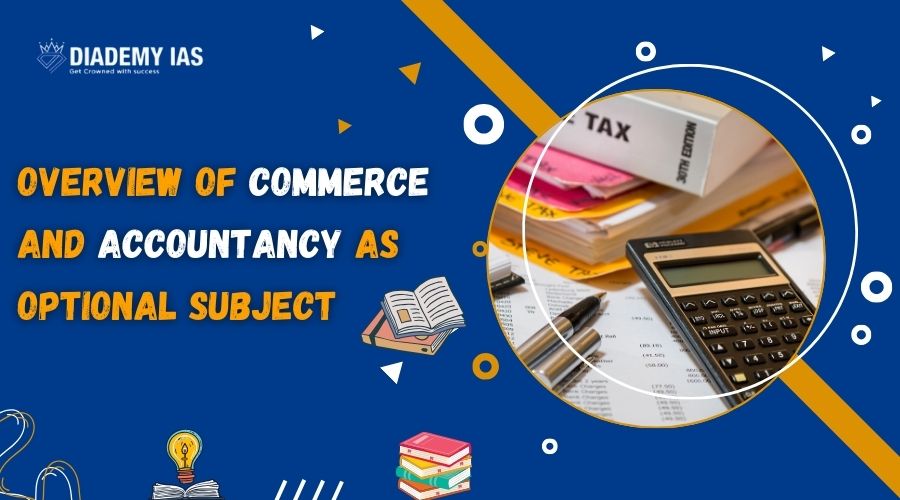
Are you considering taking the UPSC exam and wondering which optional subject to choose? Look no further! In this article, we will explore how Commerce and Accountancy Optional can be an excellent choice for your optional subject.
Commerce and Accountancy is a popular option among UPSC aspirants due to its practical relevance and vast career opportunities. This subject equips you with knowledge and skills in areas such as accounting principles, financial management, commercial laws, and business strategies.
By choosing Commerce and Accountancy as your optional subject, you gain a competitive advantage as it is considered scoring and less time-consuming compared to other subjects. Moreover, it provides a foundation for understanding economic policies, fiscal management, and public finance, which are crucial for the civil services examination.
So, if you have a passion for numbers, an analytical mind, and a desire to make an impact in the world of commerce and administration, choosing Commerce and Accountancy as your optional subject for the UPSC exam might just be the perfect fit for you.
Overview of Commerce and Accountancy as optional subject
Commerce and Accountancy is a subject that deals with the various aspects of commerce, trade, and financial management. It covers topics such as accounting principles, financial reporting, auditing, business economics, commercial laws, and corporate governance. This subject not only provides a strong foundation in commerce and accounting principles but also explores the practical applications of these concepts in real-world scenarios.
The syllabus for Commerce and Accountancy is comprehensive and covers a wide range of topics. It includes subjects like financial accounting, cost accounting, management accounting, auditing, taxation, economics, business law, and corporate governance. The syllabus is designed to provide a deep understanding of the concepts and principles of commerce and accounting, as well as their practical applications in business and administration.
The exam pattern for Commerce and Accountancy consists of two papers, each carrying a maximum of 250 marks.
Paper I focuses on accounting principles and practices, financial management, and financial markets.
Paper II covers topics such as cost accounting, management accounting, auditing, and taxation.
The exam is conducted in a descriptive format, requiring candidates to write detailed answers to the questions asked.
Benefits of choosing Commerce and Accountancy as an optional subject
Choosing Commerce and Accountancy as your optional subject for the UPSC exam offers several benefits.
Firstly, it provides a practical understanding of commerce, finance, and accounting principles, which are essential for a career in the civil services or related fields. The knowledge gained from studying this subject can be directly applied to real-world situations, making it highly relevant and useful.
Secondly, Commerce and Accountancy is considered a scoring subject in the UPSC exam. The concepts and principles are logical and straightforward, making it easier to grasp and remember. With proper preparation and practice, it is possible to score well in this subject and improve your overall exam performance.
Furthermore, Commerce and Accountancy is a less time-consuming subject compared to some other optional subjects. The syllabus is manageable, and the concepts are relatively easier to understand. This allows candidates to allocate more time to other subjects or areas that require additional attention.
Diademy IAS Commerce and Accountancy Optional Toppers
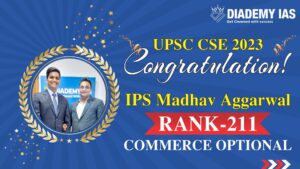
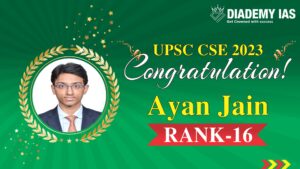
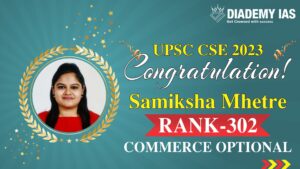

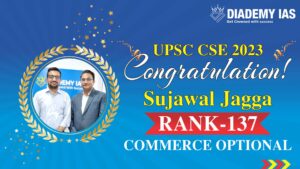
Tips for preparing for Commerce and Accountancy in the UPSC exam
Preparing for Commerce and Accountancy in the UPSC exam requires a systematic approach and dedicated effort. Here are some tips to help you effectively prepare for this subject:
- Understand the syllabus: Start by thoroughly understanding the syllabus for Commerce and Accountancy. Divide it into manageable sections and create a study plan accordingly.
- Refer to standard textbooks: Use standard textbooks recommended for this subject to build a strong foundation. Some popular textbooks include “Financial Accounting” by T.S. Grewal, “Cost Accounting” by M.N. Arora, and “Business Law” by P.C. Tulsian.
- Practice previous years’ question papers: Solving previous years’ question papers will help you understand the exam pattern, identify important topics, and improve your time management skills. It will also give you an idea of the type of questions asked in the exam.
- Take mock tests: Mock tests are a great way to evaluate your preparation level and identify areas that need improvement. Joining a test series specifically designed for Commerce and Accountancy will give you a realistic exam experience and help you assess your performance.
- Stay updated with current affairs: Commerce and Accountancy is a dynamic subject that requires knowledge of current business and economic trends. Stay updated with the latest news, economic policies, and business developments to enhance your understanding of the subject.
- Practice numerical problems: Commerce and Accountancy involves numerical calculations and problem-solving. Practice solving numerical problems from topics like financial accounting, cost accounting, and taxation to improve your speed and accuracy.
- Seek guidance from experts: If you are facing difficulties in understanding specific topics, seek guidance from subject experts or experienced faculty members. They can provide valuable insights, clarify doubts, and suggest effective study techniques.
Remember, consistent effort and regular revision are key to mastering Commerce and Accountancy for the UPSC exam. Stay focused, stay motivated, and stay committed to your preparation journey.
Challenges about Commerce and Accountancy as an optional subject
While Commerce and Accountancy offers several advantages as an optional subject for the UPSC exam, there are also some challenges and misconceptions associated with it.
One challenge is the vastness of the syllabus. Commerce and Accountancy covers a wide range of topics, and it can be overwhelming for candidates to cover everything in depth. It is important to prioritize the topics based on their weightage in the exam and focus on understanding the concepts rather than just memorizing them.
Additionally, some candidates may find the numerical aspect of Commerce and Accountancy challenging. The subject involves calculations, ratios, and financial analysis, which may require additional practice and understanding. Developing strong mathematical and analytical skills can help overcome this challenge.
Lastly, there is a misconception that Commerce and Accountancy is a theoretical subject with limited practical applications. However, this subject goes beyond theory and explores the practical aspects of commerce, finance, and accounting. Understanding the practical implications of the concepts is crucial for answering questions effectively in the exam.
Alternatives to Commerce and Accountancy as optional subjects for the UPSC exam
While Commerce and Accountancy can be a great choice for your optional subject, it may not be suitable for everyone. If you are not inclined towards commerce or finance-related topics, there are several other options available for the UPSC exam. Some popular alternatives include:
- History: History is a subject that offers a deep understanding of the past, which is crucial for understanding the present and shaping the future. It covers topics like ancient, medieval, and modern history, world history, and Indian culture.
- Geography: Geography explores the physical and human aspects of the Earth, including topics like physical geography, human geography, environmental geography, and geopolitics. It helps in understanding the interaction between humans and their environment.
- Political Science and International Relations: This subject focuses on political institutions, theories, international relations, and global issues. It provides insights into governance, diplomacy, foreign policy, and international organizations.
- Sociology: Sociology studies human society, social behavior, and social interactions. It covers topics like social institutions, social change, social stratification, and social problems. It helps in understanding the dynamics of society and its impact on individuals.
- Public Administration: Public Administration deals with the study of administrative systems, governmental policies, and public management. It covers topics like administrative theories, public policy, personnel administration, and financial administration.
It is important to choose an optional subject that aligns with your interests, strengths, and career aspirations. Consider your aptitude, background, and the availability of resources before making a decision. Consult with mentors, teachers, and experienced candidates to gain insights and make an informed choice.
Let's Connect
Conclusion and final thoughts
Choosing Commerce and Accountancy as your optional subject for the UPSC exam can be a wise decision if you have a genuine interest in commerce, finance, and accounting. It offers practical relevance, scoring potential, and numerous career opportunities. By studying this subject, you not only gain knowledge and skills in commerce and administration but also develop a strong foundation for understanding economic policies, fiscal management, and public finance.
However, it is important to remember that the choice of optional subject should be based on your individual interests, strengths, and career goals. Consider the challenges, misconceptions, and alternatives discussed in this article before making a decision. Regardless of the subject you choose, consistent effort, effective preparation, and dedication are key to success in the UPSC exam.
So, if you have a passion for numbers, an analytical mind, and a desire to make an impact in the world of commerce and administration, consider choosing Commerce and Accountancy as your optional subject for the UPSC exam. Embrace the challenges, overcome the misconceptions, and embark on a journey that can shape your future and contribute to the nation. Good luck!